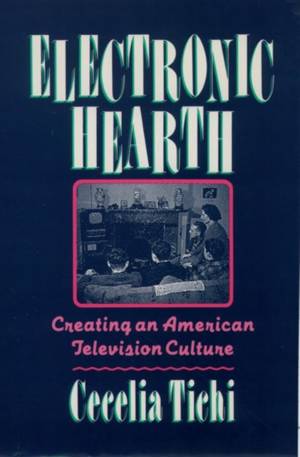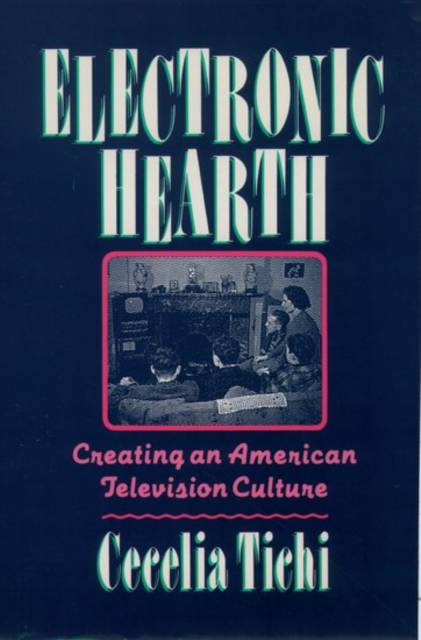
- Retrait gratuit dans votre magasin Club
- 7.000.000 titres dans notre catalogue
- Payer en toute sécurité
- Toujours un magasin près de chez vous
- Retrait gratuit dans votre magasin Club
- 7.000.0000 titres dans notre catalogue
- Payer en toute sécurité
- Toujours un magasin près de chez vous
38,95 €
+ 77 points
Description
We all talk about the "tube" or "box," as if television were simply another appliance like the refrigerator or toaster oven. But Cecilia Tichi argues that TV is actually an environment--a pervasive screen-world that saturates almost every aspect of modern life. In Electronic Hearth, she looks at how that environment evolved, and how it, in turn, has shaped the American experience.
Tichi explores almost fifty years of writing about television--in novels, cartoons, journalism, advertising, and critical books and articles--to define the role of television in the American consciousness. She examines early TV advertising to show how the industry tried to position the new device as not just a gadget but a prestigious new piece of furniture, a highly prized addition to the home. The television set, she writes, has emerged as a new electronic hearth--the center of family activity. John Updike described this "primitive appeal of the hearth" in Roger's Version: "Television is--its irresistible charm--a fire. Entering an empty room, we turn it on, and a talking face flares into being." Sitting in front of the TV, Americans exist in a safety zone, free from the hostility and violence of the outside world. She also discusses long-standing suspicions of TV viewing: its often solitary, almost autoerotic character, its supposed numbing of the minds and imagination of children, and assertions that watching television drugs the minds of Americans. Television has been seen as treacherous territory for public figures, from generals to presidents, where satire and broadcast journalism often deflate their authority. And the print culture of journalism and book publishing has waged a decades-long war of survival against it--only to see new TV generations embrace both the box and the book as a part of their cultural world. In today's culture, she writes, we have become "teleconscious"--seeing, for example, real life being certified through television ("as seen on TV"), and television constantly ratified through its universal presence in art, movies, music, comic strips, fabric prints, and even references to TV on TV.
Ranging far beyond the bounds of the broadcast industry, Tichi provides a history of contemporary American culture, a culture defined by the television environment. Intensively researched and insightfully written, The Electronic Hearth offers a new understanding of a critical, but much-maligned, aspect of modern life.
Tichi explores almost fifty years of writing about television--in novels, cartoons, journalism, advertising, and critical books and articles--to define the role of television in the American consciousness. She examines early TV advertising to show how the industry tried to position the new device as not just a gadget but a prestigious new piece of furniture, a highly prized addition to the home. The television set, she writes, has emerged as a new electronic hearth--the center of family activity. John Updike described this "primitive appeal of the hearth" in Roger's Version: "Television is--its irresistible charm--a fire. Entering an empty room, we turn it on, and a talking face flares into being." Sitting in front of the TV, Americans exist in a safety zone, free from the hostility and violence of the outside world. She also discusses long-standing suspicions of TV viewing: its often solitary, almost autoerotic character, its supposed numbing of the minds and imagination of children, and assertions that watching television drugs the minds of Americans. Television has been seen as treacherous territory for public figures, from generals to presidents, where satire and broadcast journalism often deflate their authority. And the print culture of journalism and book publishing has waged a decades-long war of survival against it--only to see new TV generations embrace both the box and the book as a part of their cultural world. In today's culture, she writes, we have become "teleconscious"--seeing, for example, real life being certified through television ("as seen on TV"), and television constantly ratified through its universal presence in art, movies, music, comic strips, fabric prints, and even references to TV on TV.
Ranging far beyond the bounds of the broadcast industry, Tichi provides a history of contemporary American culture, a culture defined by the television environment. Intensively researched and insightfully written, The Electronic Hearth offers a new understanding of a critical, but much-maligned, aspect of modern life.
Spécifications
Parties prenantes
- Auteur(s) :
- Editeur:
Contenu
- Nombre de pages :
- 272
- Langue:
- Anglais
Caractéristiques
- EAN:
- 9780195079142
- Date de parution :
- 29-10-92
- Format:
- Livre broché
- Format numérique:
- Trade paperback (VS)
- Dimensions :
- 156 mm x 233 mm
- Poids :
- 385 g

Les avis
Nous publions uniquement les avis qui respectent les conditions requises. Consultez nos conditions pour les avis.






